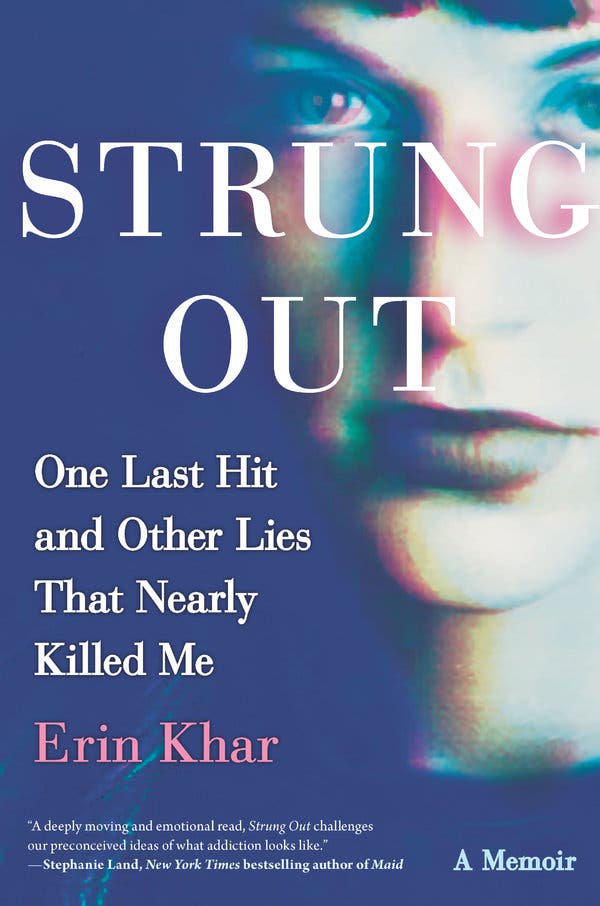STRUNG OUT
One Last Hit and Other Lies That Nearly Killed Me
A Memoir
By Erin Khar
The standard narrative of the opioid epidemic begins in the 1990s, when American pharmaceutical companies flooded the country’s mostly rural, mostly working-class areas with potent prescription painkillers. When the patients who became addicted were finally cut off from these pills, they turned in desperation to their illegal cousin, heroin.
Erin Khar’s debut memoir, “Strung Out,” about her own 15-year addiction and eventual recovery, looks nothing like this standard narrative. Khar grew up not in remote Appalachia, but in a well-off family in Los Angeles. Yes, her drug use begins with a pill — an expired Darvocet stolen from her mother’s medicine cabinet, when she was 8 — but her downward spiral of dependency doesn’t take hold until five years later, with a boyfriend and a needle. “Have you ever done heroin?” he asks on their first date. She hasn’t, but her anxiety is so intense that she thinks, “I want to feel anything else other than everything I have ever felt.”
The book starts out with the thrill of an early Bret Easton Ellis novel — except Khar’s characters aren’t nihilists. She provides a voyeuristic look into her mid-80s world of prep schools and famous L.A. rock clubs; into her life as the cool rich girl with her older boyfriend and Guess jeans. As time progresses so does Khar’s heroin use, until by the early 2000s she’s using so much on her own that she’s resorted to pawning family heirlooms to buy drugs.

Though it may not mirror that standard narrative of our national opioid epidemic, Khar’s story nonetheless illustrates many essential facets of addiction. For one, its significant overlap with mental illness: Diagnosed with depression as an adult, she realizes it’s a fact both “ridiculous” and “entirely true” that “the drugs were once what kept me alive.” And, while some effects of addiction might be obvious to the naked eye (the chaos, the self-destruction, the incomprehensible behavior), its internal mechanisms are not so. Khar’s specificity in reliving her first-person experience shows the intricacy and cunning that are required of an addict, like when she would stock a Hello Kitty pencil case with pre-filled needles, “ready to go in case I needed to be quick.” These details go part of the way toward explaining to non-addicts how easy it is to slip from casual use into full-blown dependency — followed by the devastating cycles of shame, the illogical reasoning that leads one from sobriety to relapse.
Khar’s voice can take on a certain glibness, prone to simplifying complex situations into a few trite words (“I had struggled with the urge to kill myself — to cut myself out of my own skin — for many years”; her mom’s boyfriend is “the father figure I needed, the kind my dad was just not capable of being”). Some amount of brevity is needed to usher along the narrative, but at times here it feels careless.
As is the responsibility of anyone publishing a memoir of upper-crust life, Khar acknowledges how good she has had it. But there are faults by omission, namely in her attribution of her sobriety to the birth of her son: “I love him more than I hate myself. I knew I would never use drugs again, and I didn’t.” The sincerity of this sentiment is undercut by the reality of the scores of mothers who are also users. Khar admits, “Maybe I won the lottery,” but neglects to cite her ability to afford the multiple trips to expensive rehabs, parents who love her imperfectly yet consistently, her access to housing and higher education and employment. The result feels like a pre-emptive apology, at once glossed over and heavy-handed.
Still, there is more to admire than not. Khar’s buoyant writing doesn’t get mired in her dark subject matter. There is an honesty here that can only come from, to put it in the language of 12-step programs, a “searching and fearless moral inventory.” This is a story she needed to tell; and the rest of the country needs to listen.
 EU News Digest Latest News & Updates
EU News Digest Latest News & Updates



